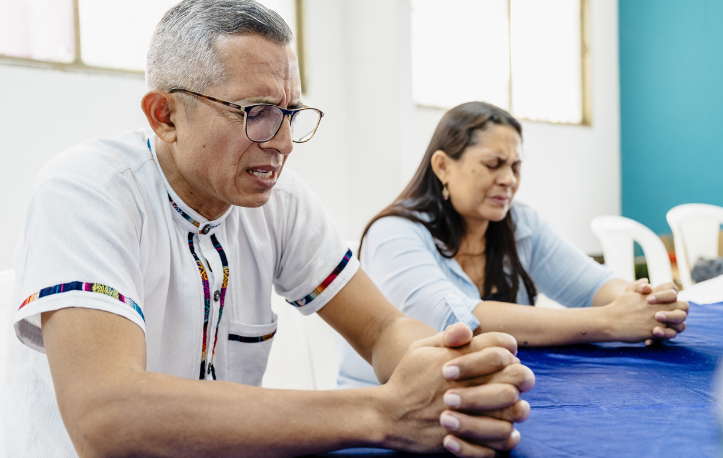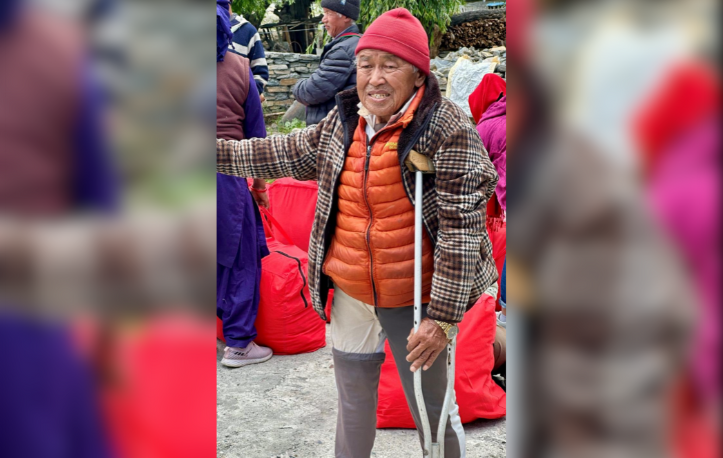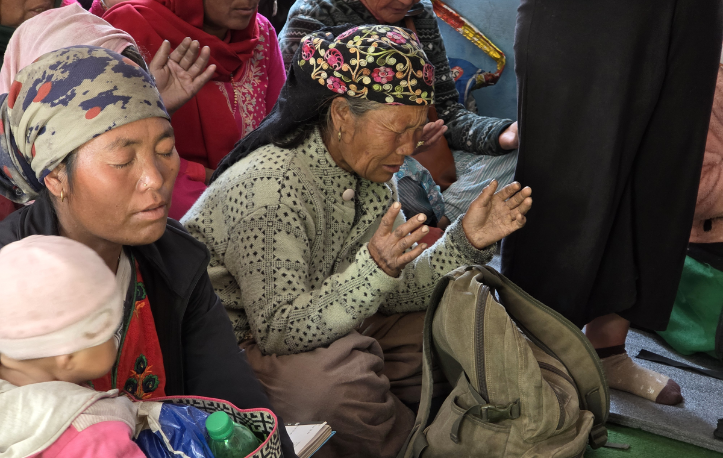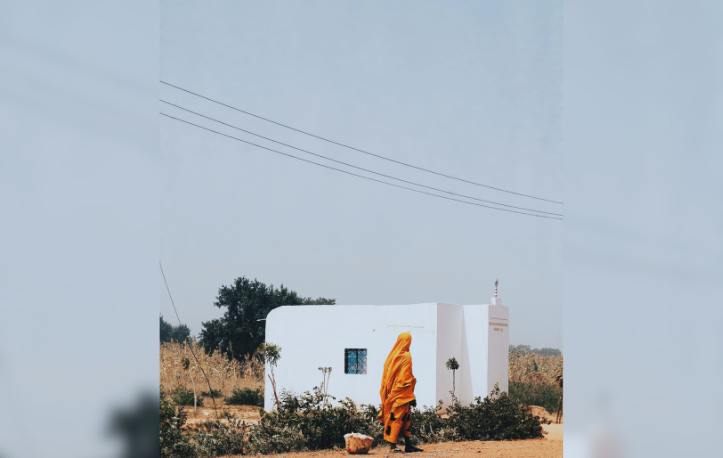When Gonzalo began working in the Colombian coca fields and labs that produce cocaine, he was a hard man — and an increasingly desperate one. His father had left the family when Gonzalo was young, and his mother forced the children to fend for themselves. His brother, who joined one of the guerrilla groups as a youth, had died violently at age 16.
“I grew up in an environment where you have to fight to survive,” Gonzalo said. The fighting didn’t end with adulthood; he was physically and verbally abusive towards his wife, Edilma, and their four daughters.
Though the coca harvest provided steady work and a regular income, Gonzalo lived under constant threat of attack. The coca fields, located inside Colombia’s notorious ‘red zones’, are the domain of Marxist guerrillas like the Revolutionary Armed Forces of Colombia (FARC) and various right-wing paramilitaries. These groups fight for control of the drug trade and resist government attempts to eradicate it.
The guerrillas, protective of their lucrative crops, punish workers they don’t know or can’t trust, and government forces routinely raid the guerrilla compounds in attempts to destroy the coca fields. Bombs and bullets frequently send workers fleeing into the brush.
Gonzalo eventually found his way out of the coca fields and into construction work. But he still couldn’t shake the desperation caused by years of violence and an inability to control his own anger and violent tendencies.
“I didn’t know how to pray,” he said, “so I just prayed how I felt. On several occasions, I had to run to my bedroom and cry out for God’s help.”
After an incident with some soldiers that resulted in a severe beating and a deepening sense of hopelessness in his family, Gonzalo sought the Lord in earnest. In 2006, his search led him to church and an encounter with the living God.
“I asked [the Lord] to do something with my life,” Gonzalo said. “I started to feel strange things that I had never felt before. My mind was renewed and I received Christ. I started thinking differently, speaking differently. I was in love with the Lord.”
When Edilma saw the dramatic change in her husband, she was convinced of the existence of a loving God. “We had been together 11 years,” she said, “and he always wanted to change but never could. In the two hours we were in the church, he came in as one man and left as another. I realised that there really is a God, a very powerful God, who can make that kind of transformation.”
Both their hearts and home changed dramatically. “There wasn’t mistreatment, neither verbal nor physical,” Edilma continued. “God made a transformation in all of us. That is when we began serving the Lord very passionately.”
A Better Harvest
The pastor at their church helped Gonzalo and Edilma learn and grow as followers of Christ. As their faith matured, they took on leadership roles, and in 2016 they were sent out to plant a new church. “It was me, my wife and another couple,” Gonzalo recalled. “There wasn’t a church; there was just a house.”
Colombia’s red zones, already dangerous because of ongoing violence, narcotics trafficking and other criminal activities, are especially perilous for Christians. The guerrillas specifically target Christians because their obedience to God’s Word makes them natural opponents of the militants’ cause. Worship, evangelism and travel are difficult in these areas, as the guerrillas seek to control all aspects of the villagers’ lives.
Despite the risks, Gonzalo and Edilma willingly returned to a red zone, this time as ministers of the gospel prepared for spiritual battle. They planted a church and trusted God to provide a harvest far more valuable than coca leaves.
“God is faithful,” Gonzalo said. “He opened this door for us … and we have seen the miracles God has done with these families. More people are coming and adding to the numbers. How have we seen God work? In the transformation of families through the Word. These families have changed, been restored. God has given us families, entire families, that have converted.”
Those who have been restored and converted include some from the enemy camp — former guerrillas who had become disillusioned with the violence but were still rejected by their community because of their former affiliation with the FARC. “They are rejected by others in the community, but we show them love,” Gonzalo said.
That love, however, is seen as a threat by the guerrillas who control the area. In early 2024, a local FARC commander gathered townspeople for a meeting and told them that church services were prohibited. The cost of disobedience, even when not stated, is well understood. “If we disobey their orders, we will have problems with them,” Edilma said. “They will either kick us out [of the village], or they will find other measures that they take.”
The other measures include surveillance, kidnapping, assault, torture and murder — potential consequences that every Christian minister in a Colombian red zone must consider. Gonzalo’s congregation is not immune. One church leader was kidnapped for four days and chained by the neck during his captivity; Gonzalo is routinely watched, followed and questioned; and in one village, an entire congregation of 25 believers was forced to flee.
“That is just kind of the way things happen here,” Gonzalo said. “But in the midst of that, God gives the strength and ability to keep preaching the gospel.”
Ministry on the Move
Gonzalo and his family acknowledge the very real threats they face and the fear that results, but they take comfort and encouragement from Scripture. As with many Christians over the centuries, Edilma takes solace and strength from Psalm 23.
Gonzalo, meanwhile, looks to 2 Chronicles 16:9 as an encouragement to persevere in righteousness: “For the eyes of the Lord run to and fro throughout the whole earth, to show Himself strong on behalf of those whose heart is loyal to Him.”
Preaching the gospel under the threat of violence requires Gonzalo and Edilma to keep their ministry work light and mobile. Their primary support comes from three of their daughters and two sons-in-law.
“We don’t get together as a group,” Edilma said, “because [the guerrillas] won’t allow it.” Instead, they travel home to home, visiting families individually. While they could stay in larger, and therefore safer, cities, they choose to visit smaller villages that suffer great oppression from local militants. Front-line workers have provided Gonzalo and Edilma with portable ministry tools to facilitate their work in areas severely affected by conflict and violence.
As anger and hate permeate the guerrilla groups, the communities dominated by militants, and even some Christians who have suffered great fear and deep loss in the red zones, Gonzalo and Edilma request prayer that the Lord will continue to give them a passion for the ministry.
“Sometimes we think we would be better off going somewhere else,” Edilma said, “but then we think of the souls that are in need. Who is going to take the Good News to them if we leave? There are so many people who are hurting … there are people who need Christ. Christ is the one who heals their heart, and we are there to reach them.”
Gonzalo and Edilma have taken to heart the promise of Galatians 6:9, which their pastor shared with them as encouragement: “Let us not grow weary while doing good, for in due season we shall reap if we do not lose heart.”




Submit a Prayer